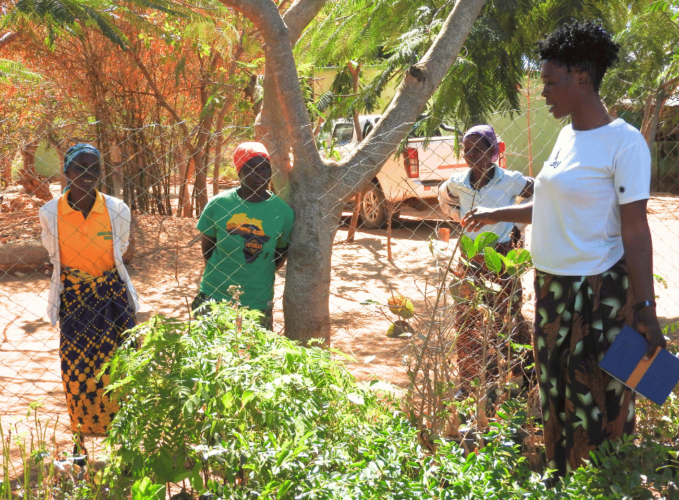Climate change may seem overwhelming, but African communities are already drawing on centuries of wisdom and combining it with innovation to build resilient, sustainable futures. Here are practical, locally informed strategies that can inspire farmers, community leaders, and development actors across the continent, as featured by Farm Radio International:
Climate change is taking a toll in Uganda’s Teso region, one of the country’s least forested areas. Jessica Sheillah Aanyu and her husband co-founded Trees for Life, a non-profit organization with the bold goal of planting 25 million trees, ten for each of Teso’s 2.5 million residents. They are well on their way to achieving that goal by organising tree-planting marathons and educational programs.
Action: Choose a tree species suited to your location, plant with care, and water regularly.
In Kugzua, a rural community in northern Ghana, climate change severely reduced crop yields, pushing farmers to use harmful chemical fertilizers. As an alternative, the community turned to composting using farm waste, such as sorghum, millet and rice stalks, mixed with neem leaves and ash. The result was improved soil fertility, lowered costs and limited health risks from chemical fertilizers.
Action: Set up a compost bin or pile on bare ground in a sunny, well-ventilated spot. Pile up materials and turn them regularly to speed up the decomposition process. This will help farmers ease their concerns about providing water for both crops and livestock.
In 2024, Zambia declared a national emergency due to a historic drought. In response, the Malili Women’s Cooperative in Chikankata turned to crop rotation and drought-resistant crops such as sorghum and millet. This shift improved soil fertility and yields, reduced reliance on chemical fertilizers and inspired other communities to follow suit.
Action: Choose climate-resilient plants, be they crops or flowers, suited to your region to better withstand hot and dry summers and save you from watering so much.
Uganda’s Mabamba Swamp is home to over 300 bird species, but their numbers are on the decline. Local tour guide Joseph Kimbagaya is working to change that by organizing bird counts to track populations. This offers valuable data for conservation efforts while demonstrating how eco-tourism can boost economic activity.
Action: Sign up with a local or national conservation organization that runs wildlife count programs where you can help identify species and share your observations
In Côte d’Ivoire’s Sassandra region, Serge Doutché, founder of NGO Afrique Verte Environnement, is working to protect mangroves vital to local livelihoods. Before his NGO arrived, locals relied heavily on the mangroves for fish and firewood to make money, leading to deforestation. Now, Doutché is training locals to explore alternative income sources to help prevent mangrove destruction.
Action: Reflect on your consumer habits and their long-term impact on the planet, including energy use, food waste reduction and overall consumption.
In the small farming and fishing community of Setsinu, located in Ghana’s Volta region, climate change has caused devastating floods that have washed away crops, disrupted livelihoods, and even hindered access to education. In response, residents have turned to traditional knowledge, reviving the practice of building bunds – earthen barriers to protect farmland from rising waters.
Action: Use local and generational knowledge – such as Indigenous land stewardship, traditional farming and seasonal wisdom – to drive climate adaptation in your community.
Climate change has caused destructive wildfires and windstorms near Yaara, a farming community in Ghana’s Bono East region. Despite opposition from surrounding communities, local leaders enforced a community law banning tree felling for charcoal. The community remains committed to conservation, with a committee to monitor illegal activity in place—and it’s paying off with stronger farming yields than surrounding deforested areas.
Action: Collaborate with individuals and organizations to address climate challenges on a larger scale.
Why These Practices Matter
-
Cost-effective and accessible: These solutions rely on community labour and locally available resources, not expensive imports, ensuring everyone can participate.
-
Adapted to local realities: Rooted in regional climates, soils, and traditions, they’re field-tested and culturally aligned.
-
Building resilience: They strengthen the land’s natural capacities—water retention, natural fertility, and ecosystem balance, to help communities better withstand environmental shocks.
-
Strengthening community bonds: Through knowledge-sharing and communal effort, these practices support collective ownership, empowerment, and intergenerational learning.
How Communities Can Start
-
Take small, meaningful steps: Begin planting trees, composting, or mulching on a manageable scale, then expand as success grows.
-
Host knowledge-sharing forums: Leverage radio, community meetings, or school groups to spread insights and celebrate successes.
-
Adapt solutions locally: What works in one village might need tweaking in another. Adapt with local input.
-
Champion communal hubs: Encourage community champions, elderly farmers, youth leaders, or women’s groups, to lead and sustain these practices.
In Summary
These seven practical, ground-up solutions reveal the strength of African communities in adapting to climate change using what they know best. From planting a single tree to conserving water and protecting nature, every action contributes to a climate-smart, resilient future—rooted in local knowledge and collective effort.
Main article from the Farm Radio International website

